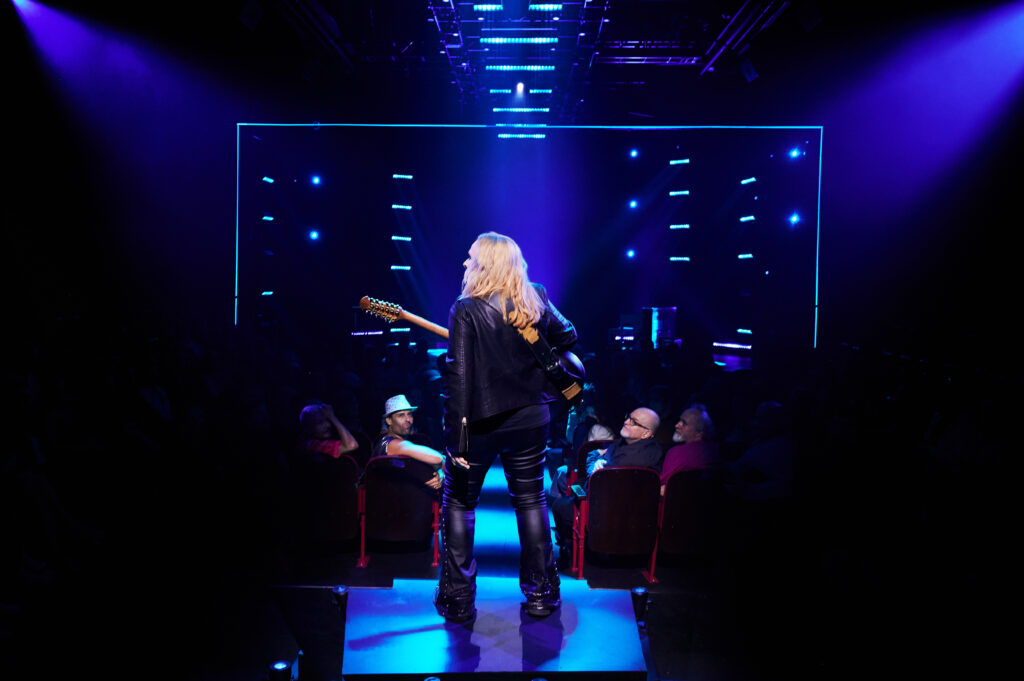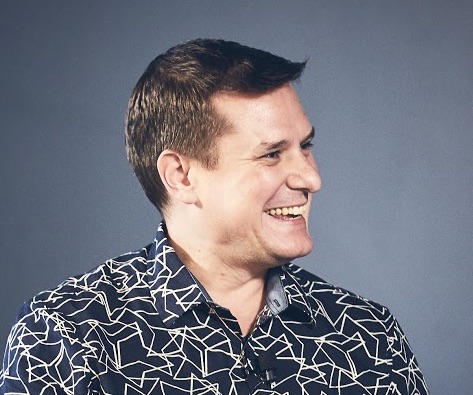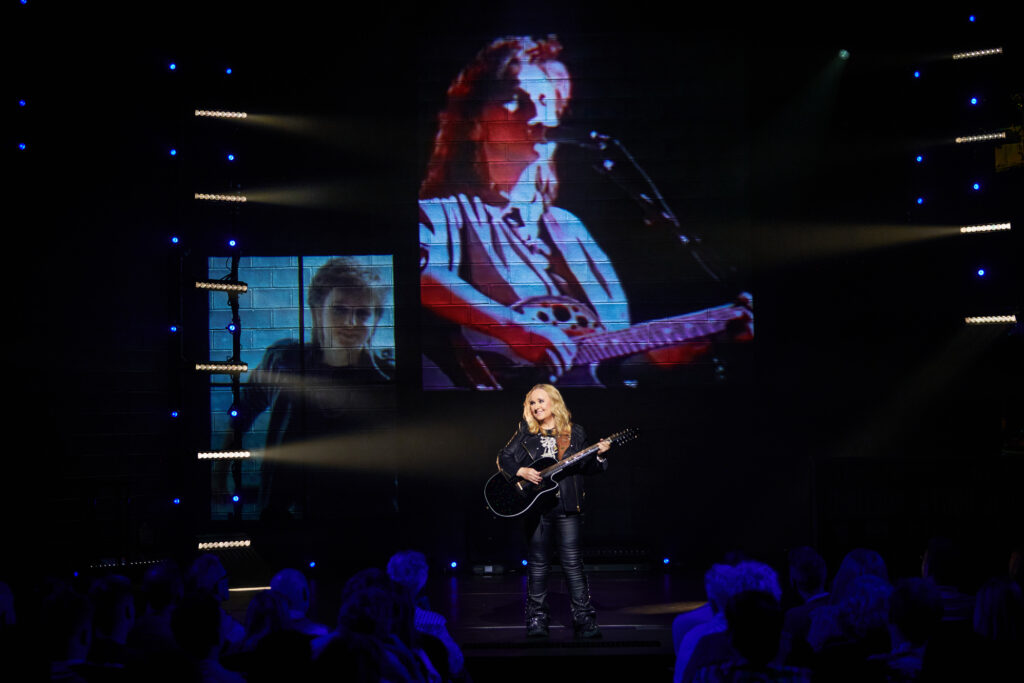How lesbians taught me queer love could thrive
After attending Melissa Etheridge’s Broadway show, My Window, gay man Jerry Portwood recalls how Etheridge’s songs helped him during his teenage dating years in the Deep South.
While growing up, Melissa Etheridge’s “Come to My Window” was the song that I over-related to. It reminded me of those nights that I’d sneak out of my bedroom window and walk the mile to Ryan’s window, tap on it, and wait to see if he’d be home. If he opened, we’d talk for hours: me outside his window, him in the warm dark of his bed.
One night, he even let me crawl in and spoon. Later, when he insisted he’d drive me home before sunrise so I wouldn’t get caught, I leaned over to kiss him. And he clenched up, blocking my tongue with his teeth. “I actually don’t think I’m bisexual,” he confessed. “I think I just wanted to sound cool.” After that rejection, Etheridge’s song’s melodramatic lyrics spoke to me:
“And I would stand inside my hell And hold the hand of death You don't know how far I'd go To ease this precious ache And you don't know how much I'd give Or how much I can take"...
That all took place my sophomore year while living on an Air Force Base in Okinawa, Japan. Where I’d come out to my parents and friends around the same time President Clinton was signing “Don’t ask, Don’t tell” into law. I felt totally isolated, yet had to live in my truth, as the kids say these days. The next year, my dad was stationed in Valdosta, Georgia, so now I was in the Deep South, feeling even more alone. Although I was warned about the bigotry of the Bible Belt, I refused to go back in the closet.
“Can’t you keep that to yourself?” my mother urged in her noncommittal, question-based way. Although both my parents accepted my coming out better than other erstwhile Southern Baptists might (“We just want you to be happy,” was their constant refrain), an undercurrent of blame and shame always remained: that my identity would harm my siblings; that I was harboring some sick monster just waiting to pounce. Mom was a peculiar knot of contradictions: She loved RuPaul’s VH1 talk show and Melissa’s anthemic tracks. As she sang along to “Yes I Am”—apparently oblivious to any subtext to the lyrics—I hoped when she heard the line “A desire they cannot comprehend” that she understood that’s how I felt. Nope, no epiphany there.

It didn’t stop me from dating my first boyfriend, a flamboyant senior who had a car. But I broke up with him as soon as he graduated—which meant I was on the prowl. A new guy showed up in the fall, another military transplant like me, and I pounced. Marc said he had a girlfriend back in California, but I insisted that was in the past and we kissed. I was his first and soon we were in my bedroom making out any chance we got. We even had a group of female friends who would ask Marc and I to strip down to our underwear and let them watch. Who said the ‘90s weren’t queer? It was fun, but then, after one night of fumbling during an overnight theater trip that didn’t go the way I’d hoped (my first attempt at topping, and he said he wasn’t ready), I unfairly rejected him.
Then I met the student teacher. He had tried to get with my friend, who had laughed off his advances after a date to the local Honey Bee Festival. When I found out, I was jealous and decided to seduce Larry myself. He took me to Ruby Tuesday in the mall (the fancy place for a date in our small town) “for a drink.” How grown up! While he nursed his Zima, he ordered me a Shirley Temple and tried to impress me by showing how he could tie a cherry stem with his tongue. He insisted we were just going to be friends, and then we went to the movies, held hands, and made out later in his car. I was hooked.
I ended up in the room he was renting from a nice Christian family in his church. Soon we were dating. He was 10 years older, nearing 30, and I was his “little secret.” So why wouldn’t that mean something when Melissa came out with her next album the following year with the same title. “I Want to Come Over” had its own reverberations for a horny 17-year-old boy. It took a lesbian singing about lust to make sense of these confusing emotions.
My other great music loves of that time were either queer-coded Brits—The Smiths, Depeche Mode, The Cure—or Michael Stipe of REM. He was queer before it was understood in our lexicon, and we just thought he was ashamed of saying he was gay in case it lost the band some hard-won popularity. Nonetheless, I crushed on Stipe as he keened and did his arm-flapping dances. My friends and I also sang along to the Indigo GIrls’ Swamp Ophelia album and The Cranberries—anything we could belt in cathartic glee. I was also parroting Liz Phair’s Exile in Guyville, that I wanted “to be your blowjob queen.” The Black girls I worked with at my part-time job at Wendy’s off of I-75 really got a kick out of that one. “What is that crazy white boy singing about now?” When I explained to my manager that my boyfriend made me late one Saturday afternoon, she revealed how she too enjoyed anal sex because she could finally relax and not worry about getting pregnant. It seems confessional singer-songwriters brought us all together in unexpected ways.
After graduation, Larry suggested we celebrate by seeing Melissa Etheridge in concert in Atlanta that July, 1995. I invited Marc and another (at the time) female-identified friend (they now identify as genderqueer) to join us. Was it strange that a teacher was traveling with three teenagers to the big city? A guy who was a decade older than us? Sure. But he was also the youth minister at his church, so he had a habit of being around high schoolers, another way he rationalized why he related to us. I just thought I was extremely mature, wise beyond my years, and secretly lorded over my peers that I was his chosen. I was ready to be out of this boring small town, ready to be an adult and leaving in a few months for college. Was he a predator? I didn’t think so at the time. Now I see it differently. But that summer weekend at Lakewood Amphitheatre, I was just thrilled to be at my first real concert. With my first love. Surrounded by gay men and lesbians. It felt like the future.

When I think about those years, I credit lesbians as my beacons. As a young gay boy, I didn’t have many role models. I idolized Greg Louganis, but after reading his memoir I was disappointed to learn of his low self-esteem and abusive relationship. I didn’t feel particularly drawn to the twinks or circuit queens, and I’m still a hairless something-or-other that can’t be categorized in the hirsute genre of the bear/otter/wolf trifecta. In fact, the first adult gay couple I ever knew were the moms of another straight theater kid from school. Marsha, a police officer, and Alice, a college professor, were the mothers to a clan of redneck kids. They lived in a big rambling house outside of town that felt like something from a Dorothy Allison story. I remember the time they returned from the Atlanta Pride Parade with snapshots of the Dykes on Bikes, their tits bulging from leather harnesses, and glittery gay men twirling rainbow flags with abandon. I was enthralled: I want to go there. I want to do that. When I told people I was gay in the early ‘90s, they were scared and told me it meant I would die or be alone. Those appeared to be my options. But lesbians remained optimistic, they looked forward to a tomorrow filled with peace, equity, and understanding. Melissa Etheridge’s songs were imbued with possibility.
Like most other gay kids of my generation, I didn’t listen to pronouns when I played music, which allowed me to learn about the mutability of gender. Or maybe that’s what I wish to believe. I actually yearned to hear a man sing about another man. I credit George Michael’s butt in the “Faith” video as my first awakening. But he didn’t officially come out until he was apprehended in that Beverly Hills public restroom for solicitation. And who are we kidding: Elton John was never much of a sexy heartthrob. So for whatever reason, having a woman sing about her desire for another woman felt closer to the unrequited yearnings of my adolescence than hearing straight dudes sing about a lady.
Maybe it’s that some part of me believed women loved more intensely. Women loved better. There were few examples of men loving men when I was growing up. And the only examples that I managed to glean from literature or films were often tragic tales. We were told that men fucked, and they got sick, and they died.
The only gay movie that made it into the mainstream was Longtime Companion, which was about the plague decimating a group of friends in New York (and featured straight actors in the lead roles naturally). I’d been inspired by the passion of Larry Kramer’s Normal Heart, even performing a monologue that allowed me to feel some connection to a world I didn’t understand. When I first watched the movie adaptation of Terrence McNally’s Love! Valour! Compassion!, the men were erotic and funny (and naked) but also didn’t quite feel like something to aspire to. I was more smitten with Boys on the Side. Women cuddled and cared and, as Melissa and others sang convincingly, love was real and palpable. This passion was uncontrollable and burned bright. It ached and yearned and pined.
Queer theorist José Muñoz writes that “we may never touch queerness, but we can feel it as the warm illumination of a horizon imbued with possibility.” It’s this idea of a queer future—especially one with love—that I located in pop songs. Melissa’s lyrics may sound earnest and corny, but there’s a power in a sincere singer-songwriter, unafraid of writing lyrics that are often melodramatic (“Oh, tell me does she want you, infatuate and haunt you/Does she know just how to shock and electrify and rock you/Does she inject you, seduce you and affect you, baby/Like the way I do?” I mean, come on!) I admit, it’s what brings tears to my eyes when I hear so many of Melissa’s songs, including “Pulse,” the one she wrote to honor the victims of the terrorist attack at the Florida nightclub in 2016. The refrain reinforces the need for unity in the face of hate as it repeats:
"I am human; I am love And my heart beats with my blood Love will always win Underneath the skin, everybody’s got a pulse.”
It was due to that tragedy that I finally had the opportunity to interview Etheridge while I was an editor at Rolling Stone. After I read about the devastating news of the massacre in Orlando, I sent out a slew of requests to LGBTQ musicians for comment and received messages of support and despair at the slaughter of innocent people in a queer space who were just having a good time. Later that evening, while preparing to watch the Tonys on TV, my cell vibrated. It was an unknown number, but I answered in case it was important.
“Hey, it’s Melissa.”
“Oh, hi, um…”
“Melissa Etheridge? You wanted to talk about Pulse. Well, I wrote a song in response and I want to release it. Can you talk?”
The following day we spoke further, and I was overjoyed to premiere her new song in honor of the victims. It was a career highlight, and a reminder that I’ve come a long way from those scary teenage days. Way more than I could have dreamed, if I’m being honest. Over the years, I’ve walked in Pride parades in Manchester, Berlin and Taipei. I’ve danced at clandestine parties in fields outside Havana, Cuba and visited my fair share of saunas and bathhouses around the globe. I met the love of my life and we’ve been together over twenty years—even getting legally married along the way.
This world is crazy and heartbreaking. The fact that Melissa Etheridge has traversed all these decades intact—as she explains in her Broadway show and further details in her new memoir, Talking to My Angels—is an achievement. During intermission at Melissa’s show, the line for the men’s room snaked up the stairs—composed of a majority of older gay men. That’s something that seemed impossible to witness when she began her career. It makes me proud, especially since the lives of so many gay and lesbian and bisexual and trans and queer people have been cut short prematurely. It’s a provocation to be thriving. A celebration. We may not be immortal, but we can keep creating. Keep striving. Keep singing. Keep dancing. Keep living. In defiance of them all. And thanks to Melissa, “I’ll never be the same.”
Tickets to Melissa Etheridge’s My Window are here.

About the author
Jerry Portwood is a former editor at Rolling Stone, Out magazine and New York Press. He’s a long time instructor at the New School, where he teaches essay writing and criticism. He lives in both West Harlem in New York City and Cambridge, Mass. with his husband.






